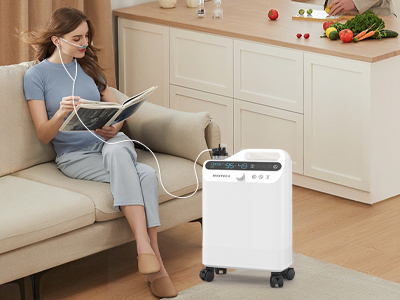01 Dec 2023
Oxygen concentrator play a pivotal role in managing hypoxemia by providing supplemental oxygen to augment blood oxygen levels, aiding in tissue oxygenation.
Hypoxemia is characterized by abnormally low oxygen levels in the blood, leading to insufficient oxygen supply to tissues and organs, compromising their proper function.

Understanding Hypoxemia
A. Causes and Symptoms of Hypoxemia
Hypoxemia can stem from various conditions such as lung diseases, heart ailments, or altitude sickness, manifesting symptoms like shortness of breath, confusion, and cyanosis.B. Consequences of Untreated Hypoxemia
Untreated hypoxemia can lead to severe complications including organ dysfunction, cognitive impairment, and in severe cases, can be life-threatening.
Mechanism of Oxygen Concentrators
A. Functionality and Oxygen Generation
Oxygen concentrators operate by drawing in ambient air, removing nitrogen, and delivering concentrated oxygen through a delivery system.
B. Delivery of Oxygen to Counter Hypoxemia
The concentrator's mechanism ensures a steady flow of oxygen, supporting normal oxygen levels in the blood, counteracting the effects of hypoxemia.

Indications for Oxygen Concentrator Use
A. Diagnosis and Monitoring of Hypoxemia
Accurate diagnosis through blood tests and continuous monitoring aids in identifying hypoxemia and determining the need for oxygen therapy.
B. Criteria for Initiating Oxygen Therapy
Specific oxygen saturation levels or arterial blood gas values guide healthcare professionals in initiating oxygen therapy for hypoxemic patients.
Benefits of Oxygen Concentrator Therapy
A. Improved Oxygenation and Tissue Function
Oxygen concentrator therapy ensures better tissue oxygenation, preventing tissue damage and supporting the normal functioning of organs.
B. Alleviation of Hypoxemia-Related Symptoms
Supplemental oxygen provided by concentrators helps alleviate symptoms like breathlessness, fatigue, and confusion, improving the patient's quality of life.
Administration and Usage of Oxygen Concentrators
A. Methods of Oxygen Delivery
Concentrators offer various delivery systems like nasal cannulas or masks, tailored to individual needs for precise and comfortable oxygen administration.
B. Monitoring and Adjusting Oxygen Levels
Continuous monitoring of oxygen saturation levels allows healthcare providers to adjust oxygen flow rates as needed for optimal therapy.
Risks and Precautions
A. Potential Risks Associated with Oxygen Concentrators
Improper use or exceeding prescribed oxygen levels may lead to oxygen toxicity or respiratory depression, underscoring the need for cautious usage.
B. Safety Measures for Effective Usage
Adherence to safety protocols and regular monitoring ensure safe and effective utilization of oxygen concentrators, minimizing potential risks.
Conclusion
A. Importance of Oxygen Concentrators in Hypoxemia Management
Oxygen concentrator stands as a cornerstone in managing hypoxemia, offering vital support to patients with impaired oxygen levels to improve their health outcomes.
B. Ensuring Effective Treatment and Patient Well-being
By understanding the mechanisms and benefits of oxygen concentrator, healthcare professionals can optimize treatment strategies, ensuring enhanced patient well-being and improved prognosis in hypoxemia management.
Keywords: oxygen concentrator
Originally published 01 Dec 2023, updated 01 Dec 2023.